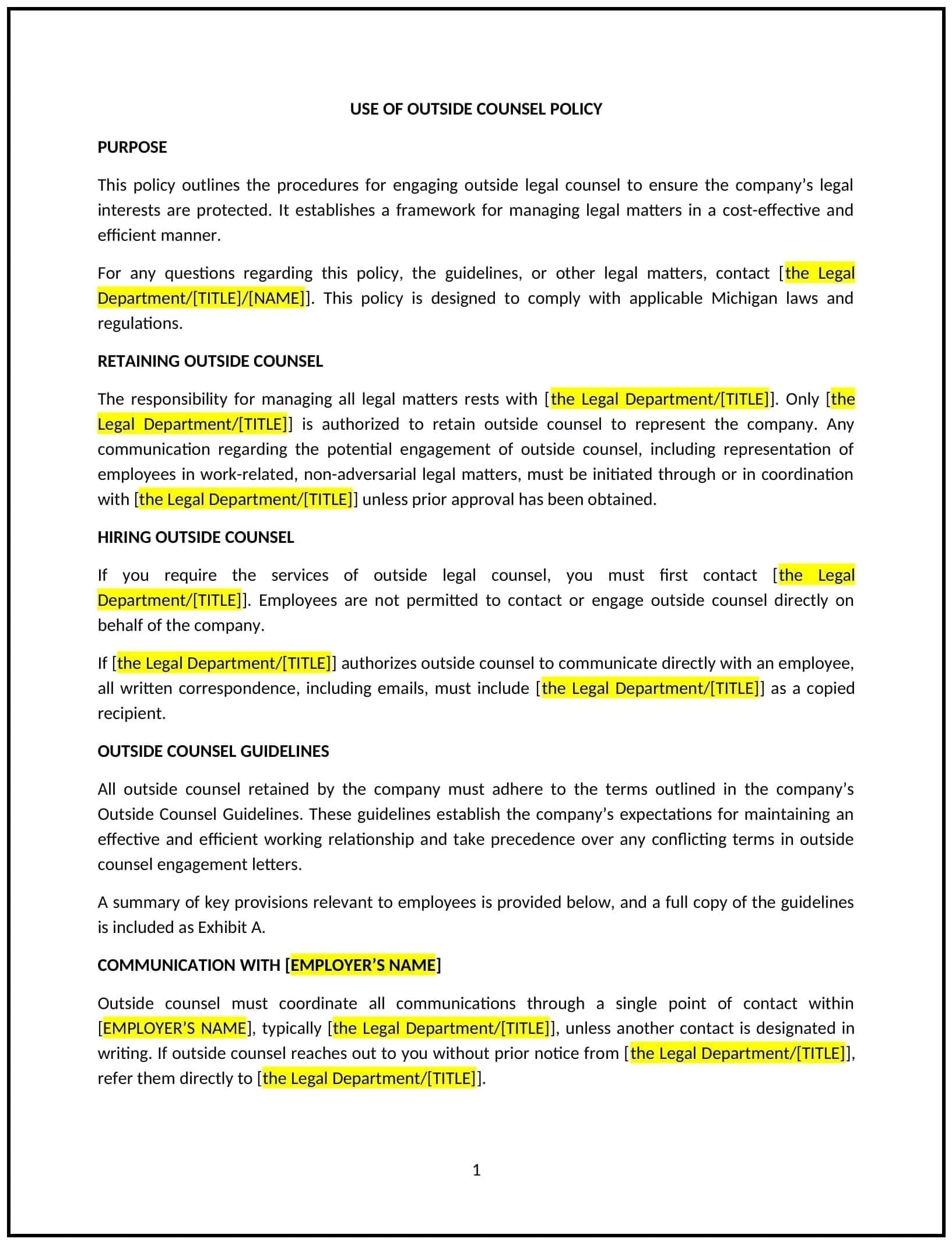Use of outside counsel policy (Michigan): Free template
Got contracts to review? While you're here for policies, let Cobrief make contract review effortless—start your free review now.

Customize this template for free
Use of outside counsel policy (Michigan)
A use of outside counsel policy provides Michigan businesses with clear guidelines for engaging and managing external legal services. This policy establishes when and how outside counsel can be used, sets expectations for the quality and cost of legal services, and outlines the procedures for selecting, hiring, and managing external lawyers or law firms. It also addresses how the business will handle conflicts of interest, confidentiality, and billing practices.
By implementing this policy, businesses can ensure that they are utilizing outside counsel effectively, controlling legal costs, and maintaining consistency in legal advice and representation.
How to use this use of outside counsel policy (Michigan)
- Define when outside counsel should be used: Clearly specify the situations in which the business should engage outside counsel, such as handling complex legal matters, litigation, regulatory compliance, intellectual property protection, or when in-house resources are insufficient.
- Set criteria for selecting outside counsel: Establish criteria for selecting outside law firms or attorneys, including factors like expertise, reputation, prior experience with similar matters, and cost-effectiveness. The policy should outline the process for vetting and engaging outside counsel.
- Establish billing guidelines: Set clear guidelines for billing arrangements, including hourly rates, retainer agreements, and any caps on fees. The policy should specify whether outside counsel should provide detailed invoices, including the breakdown of tasks, hours worked, and any additional expenses.
- Outline approval and oversight procedures: Specify the process for approving outside counsel engagements, including who is responsible for approving the selection and the budget. The policy should also include procedures for managing and overseeing the work of outside counsel to ensure that services are delivered efficiently and within budget.
- Address conflicts of interest: The policy should outline procedures for ensuring that outside counsel has no conflicts of interest when representing the business. It should specify that outside counsel must disclose any potential conflicts and ensure that their representation aligns with the company’s best interests.
- Protect confidentiality and data security: Include provisions to ensure that outside counsel maintains the confidentiality of sensitive business information. This may involve non-disclosure agreements (NDAs) or specific confidentiality clauses within the engagement letter.
- Ensure compliance with Michigan state laws: The policy should ensure that the use of outside counsel complies with Michigan’s professional conduct rules and any relevant state laws governing attorney-client relationships.
- Review and update regularly: Periodically review and update the policy to ensure it reflects changes in legal practices, business needs, or applicable laws, and continues to align with the company's goals.
Benefits of using this use of outside counsel policy (Michigan)
This policy provides several key benefits for Michigan businesses:
- Controls legal costs: By setting clear guidelines for selecting and managing outside counsel, businesses can better control legal costs and avoid unexpected expenses. It helps ensure that legal services are used efficiently and cost-effectively.
- Ensures quality legal services: Establishing criteria for selecting outside counsel ensures that businesses receive high-quality legal services from qualified professionals who are experts in the relevant areas of law.
- Mitigates legal risks: A clear policy for engaging outside counsel helps businesses mitigate legal risks by ensuring that external attorneys understand the company’s needs and provide sound, consistent legal advice.
- Protects business interests: By ensuring that conflicts of interest are avoided and that sensitive information is protected, businesses can safeguard their interests and confidential data when working with outside counsel.
- Streamlines legal operations: A clear policy for using outside counsel creates a standardized process for engaging legal services, helping businesses streamline their operations and reduce the administrative burden of managing multiple legal relationships.
- Builds strong legal partnerships: A well-managed relationship with outside counsel can help businesses establish long-term, trusted partnerships that provide valuable legal support and advice as the business grows and evolves.
Tips for using this use of outside counsel policy (Michigan)
- Communicate the policy clearly: Ensure all employees who may need legal services understand the process for engaging outside counsel. Include the policy in the employee handbook, during onboarding, and in any internal communications about legal matters.
- Vet outside counsel thoroughly: Take time to carefully vet any outside law firms or attorneys to ensure they meet the business’s criteria for expertise, reputation, and cost-effectiveness.
- Monitor legal spend: Regularly track the fees and costs associated with outside counsel to ensure they stay within the agreed-upon budget. Consider setting spending limits or requiring prior approval for costs that exceed certain thresholds.
- Establish regular communication: Maintain open and regular communication with outside counsel to ensure that the work is progressing according to expectations, and that the legal advice being provided is aligned with the business’s goals.
- Review invoices carefully: Review all invoices from outside counsel for accuracy and clarity, ensuring that they reflect the agreed-upon terms, tasks completed, and any additional expenses incurred.
- Keep legal work in-house when possible: While outside counsel can provide valuable expertise, consider keeping routine legal matters or tasks that can be handled internally in-house to save costs and improve efficiency.